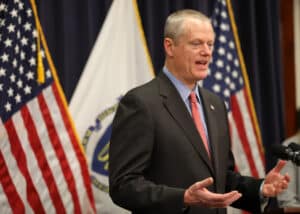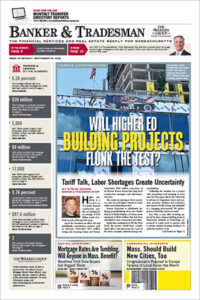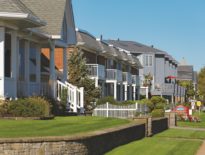
Gov. Charlie Baker addresses discusses his state of emergency declaration with reporters on Tuesday, March 10, 2002 amid a rising number of coronavirus cases in Massachusetts. Photo by Sam Doran | State House News Service
As the state works to manage the spread of the coronavirus, Gov. Charlie Baker issued his most forceful call yet for the federal government to allow private labs and hospital facilities to test for the virus as the number of cases statewide climbed to 108.
After meeting with local officials in Pittsfield, where it appears the coronavirus has spread among the community without a known link to an infected person or high-risk region of the world, Baker said Massachusetts recently got enough testing supplies to test an additional 5,000 people, but still needs to significantly up its testing.
“We certainly believe we have what I would describe as an adequate supply today, but as I said in my remarks, we need the federal government – the CDC and FDA in particular – to give hospitals and testing facilities here in Massachusetts that have the capacity to test the material and then the approval they need to actually begin to test themselves,” Baker said.
“The fact that the state lab is the single source of testing at this time is not adequate,” he added.
Testing Limited by Feds
Baker would not say exactly how many people have already been tested in Massachusetts, but said the state now has the ability to test 5,000 people in addition to the “several thousand” it had the ability to test before getting the latest supply. On Tuesday, Public Health Commissioner Monica Bharel said the state had tested roughly 400 people, and had received an approval from the federal government that would allow it to increase its testing capacity to 200 per day.
Federal guidelines have rationed testing to all but those with fever, cough and other flu-like symptoms, which develop after a person has been contagious. For weeks, doctors had to consult local or federal health officials for a decision on testing.
Baker said his administration has been in touch with the state’s Congressional delegation and the Trump administration about securing approvals for additional testing sites, including hospitals and private labs.
“We have hospitals in eastern Massachusetts, central Massachusetts, Western Massachusetts, we have labs not related to hospitals, independent privately operated labs, all of which have the capacity to do this if they can get several requirements and authorizations from the feds,” Baker said.
The number of cases of coronavirus in Massachusetts reached triple digits on Thursday, with the Department of Public Health reporting a total of 108 cases, including six confirmed by the Centers for Disease Control. That’s 13 more cases than reported on Wednesday.
Worcester County was the only county with known exposure to COVID-19 to not see an uptick in cases, while there still have been no reported cases Hampshire, Hampden, Franklin, Bristol, Plymouth, Barnstable, Dukes and Nantucket counties.
Berkshire County, where Baker was in the afternoon, now has a total of nine cases. Public health officials also added a new category to its tracking to report that eight cases are associated with Berkshire Medical Center.
Top Official: Testing Lag ‘a Failing’
The U.S. lag in coronavirus testing is “a failing,” top federal health official Dr. Anthony Fauci, of the National Institutes of Health, said Thursday, and public health experts say they still don’t have a good understanding of how widely the new virus has spread.
The effort initially was hobbled by delays in getting testing kits out to public health labs, but the stumbles have continued, leading scientists to conclude that the virus has already spread far wider than government officials are reporting.
Large-scale testing is a critical part of tracking the spread of infectious diseases and allocating resources for treatment. The lack of comprehensive figures means U.S. health providers could quickly be overwhelmed by undetected cases.
As of Thursday afternoon, the Centers for Disease Control and Prevention was reporting about 1,260 U.S. illnesses – a number that trailed independent researchers, who are adding reports from individual states more quickly.
But some experts believe any number based on test results of individual patients is a dramatic undercount. Researchers at Cedars-Sinai Medical Center in Los Angeles this week estimated that the true count of infections was close to 9,000 – about two weeks ago. The problem, experts say: the U.S. simply isn’t testing enough people.
Whatever the actual number, the U.S. effort is trailing other nations.
South Korea, a country one-sixth the size of the U.S. in terms of population, is reportedly testing 15,000 people per day. CDC Director Dr. Robert Redfield noted that officials there are using automated, high-volume testing systems capable of processing thousands of samples at a time. In contrast, the equipment used by most U.S. state and local labs requires technicians to manually process each sample in small batches, sometimes 100 or fewer per day.
Pelosi, White House Close to Deal
House Speaker Nancy Pelosi and the Trump administration said Thursday night they hoped to announce agreement Friday on a coronavirus aid package to reassure anxious Americans by providing sick pay, free testing and other resources in an effort to calm the teetering financial markets and the mounting crisis.
The new sick leave benefit would require businesses to provide up to 14 days of paid leave to workers who are home quarantined with the virus, with the federal government reimbursing them through tax credits. The bill facilitates unemployment benefits for those laid off during the crisis and boosts food and nutrition programs for working families, students and seniors. Work requirements for food stamps would be suspended, and states would be given additional Medicaid funds to cope with the crisis.
Stocks clawed back some of their losses Friday morning, with the Dow rising 2.6 percent after its worst single-day loss since 1987 on Thursday.
There’s little appetite within either party for Trump’s proposal to suspend collection of the 6.2 percent Social Security payroll tax, and Democratic economic stimulus ideas like higher more generous food stamp benefits aren’t favored by Republicans, while Democrats aren’t very friendly to GOP ideas like easing business regulations. States are already clamoring for fiscal relief from Washington as the virus threatens their budgets.
Material from the Associated Press was used in this report.
Updated 11 a.m., March 13, 2020: This story has been updated to include information about possible federal COVID-19 response legislation






